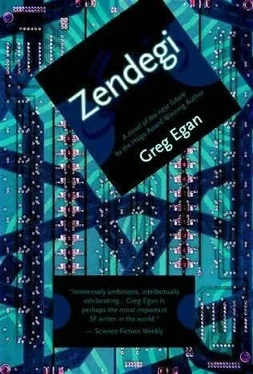Martin said, ‘So there’s no chance I’m going to… stop breathing, or have a heart attack?’
‘The chances of any adverse side-effects are extremely low,’ Dr Zahedi assured him. ‘Even with your impaired liver function, I’m confident that you won’t be in any danger. But I’ll be here throughout the session, to be absolutely sure that nothing goes wrong.’
‘Okay.’ Having gone out of his way to avoid the risks of surgery, Martin had a claustrophobic sense of his choices narrowing. But he was not going to be paralysed and cut wide open; he was not going to be breathing through a tube. He would be taking one tenth the dose of one component of a general anaesthetic.
‘The other aspect of the protocol that requires your consent is the use of an infrared laser to induce mild pain,’ Dr Zahedi continued. ‘This will be applied only to one finger, and the power will be well below the threshold that could cause tissue damage. There will also be a limit imposed on the number of times the laser can be used in a given period; I’ve been asked not to disclose the details, to avoid the possibility that it could reduce your aversive response. But I’m satisfied that there’s very little chance of psychological trauma.’
Martin said, ‘I’m sure I’ll be fine.’ Nasim had already explained the logic behind the finger-zapping. The drug was intended to make him more suggestible, more responsive to the images he was shown, but at the same time it would put him at risk of wandering off on a mental tangent. Eikonometrics had found that Rhesus monkeys on the same drug could be induced to keep focusing on a barrage of less-than-riveting images by inducing mild pain whenever their attention wandered. If that had got past an animal-experimentation ethics committee, Martin was willing to give it a go.
He signed the consent forms. When Nasim rejoined them and asked if he had any questions, he said, ‘Tell me once more that this isn’t going to make the Proxy permanently stoned.’
Nasim smiled; they’d been over this already. She said, ‘Giving you a drug that changes some activity patterns in your brain means we’re gathering data that’s only directly comparable to the Proxy’s activity if it’s also been subject to the same changes. So we will, in effect, need to “drug” the Proxy while we train it to match your responses. But that’s still going to bring the Proxy’s neural wiring closer to yours – with benefits that will persist when it’s operated normally.’
Martin thought he almost understood, but Nasim, seeing the lingering doubt on his face, took one more shot.
‘Think of it this way,’ she said. ‘A method actor wants to play you in a movie, so he takes you to a bar and gets you tipsy, so you open up more than you otherwise would. All he’s seeing is what you’re like on alcohol, so naïvely you could say that all he’s really gained is the power to imitate you in that particular state. But of course, it doesn’t really mean he’s going to play you as a drunk in the movie. It just means he’s got some dirt on you that helps him to play you better, sober.’
Martin said, ‘So basically, all this technology is a substitute for Robert De Niro and a bottle of Jim Beam?’
Dr Zahedi administered the injection. After a few seconds, Martin felt… pleasant. Untroubled. He sat smiling faintly while Nasim fitted the skullcap and goggles and led him to the MRI.
Before she flipped the goggles down, Nasim pushed something that looked like a thimble over Martin’s right index finger. She said, ‘If you really can’t stay focused, just take this off. But if you do that, it’s the end of the session.’
‘Okay. I understand.’
When everything was in place, the servo-motor whirred. For the past few weeks Martin had experienced a sinking feeling as he slid into the machine for his solo scans, but the drug certainly took the edge off that.
The sequence of photos that had been interrupted in his last session resumed from the beginning. Martin gazed at the old man in his earthquake-ravaged house; he was sure he’d felt sympathy for his plight before, but this time it was as if a physical barrier that had been standing between the two of them had been erased. Not only was the man’s presence more vivid and compelling, Martin found himself examining the scene as if he genuinely had a role to play, a stake in the outcome, an ongoing connection. Where would the man get food, water, shelter? What had he been through? Who was he mourning?
After a couple of seconds the man was gone, but Martin ignored the image in front of him and kept pondering the implications of the quake. His arm jerked involuntarily, as if he’d touched the edge of a hot plate and pulled his hand away before registering what had happened. Then he felt the painful jab of heat on his finger. He was prepared to believe there was no permanent damage, but the laser certainly delivered more than a tickle.
He’d lost his chance with the second image, but when the third appeared – a young Iranian couple strolling in a park – he gave it his full attention. Immersed in the scene he felt a glow of paternal warmth, as if he might have been standing before Javeed and some future daughter-in-law. Unfortunately, that glow outlasted its allotted time, and he was punished accordingly.
After that, he made an effort to prepare for the cycle: engage, react, disengage. It had to become automatic. Monkeys could do it; how hard could it be? He managed three successful immersions in a row before overshooting and burning his finger again.
Then four immersions, then… it must have been twenty minutes later that he stopped to reflect on how well he was doing. Keeping up the pace had been hard at first, but once he’d got into a rhythm-
Contemplating the task instead of performing it won him another stinging rebuke. Martin didn’t make the same mistake again. He cut short a hopeful vision of this cascade of brighter, sharper flares penetrating the fog-bound backwaters of his brain and lost himself in the flood of images, treading water in an endless present.
‘We believe it’s an inside job. The question that remains is: inside where?’
Jafar Falaki, of Falaki Associates, reached across Nasim’s desk and handed her his interim report. Ominously, the usage meter on the side of the USB stick read ‘2.7 terabytes’; Nasim decided that a brief oral summary might be helpful.
‘So you can’t rule out Zendegi’s staff,’ she said, ‘but you can’t rule out any of our providers either?’
‘Exactly.’
Nasim had been hoping that Falaki would identify some simple, foolish error that she or one of her colleagues had made, leaving Zendegi vulnerable to intrusions by any sufficiently resourceful stranger. Having found the hole in their defences they could have worked out how to plug it, and that would have been the end of it. It might not have told them who the intruder had been, but then, it would have left them with no urgent need to know their enemy’s identity. The embarrassment of having to admit to some shoddy programming would have been worth it. Anything was better than having to deal with full-blown industrial counter-espionage.
‘So where do we go from here?’ she asked. ‘We have thirty-seven providers in our pool, all with impeccable reputations, all audited and certified as thoroughly as…’
‘As thoroughly as each other?’ Falaki suggested. ‘The standard industry protocols are valuable, but they’re not a watertight guarantee of anything. What you really need to do is put pressure on them to install third-party hardware monitoring.’
Yeah, right. The major providers of Cloud computing took security very seriously, allowing independent auditors to perform snap inspections and random integrity tests. But yanking thousands of processor chips right out of their sockets and forcing them to talk to their circuit-boards through extra hardware that watched and verified their every move would not only be hugely expensive; in some of their customers’ eyes it would amount to a stark admission that there really was a problem demanding that level of overkill. For one company alone to adopt those measures would be commercial suicide. For the whole industry to adopt them, all at once, would require a miracle.
Читать дальше











